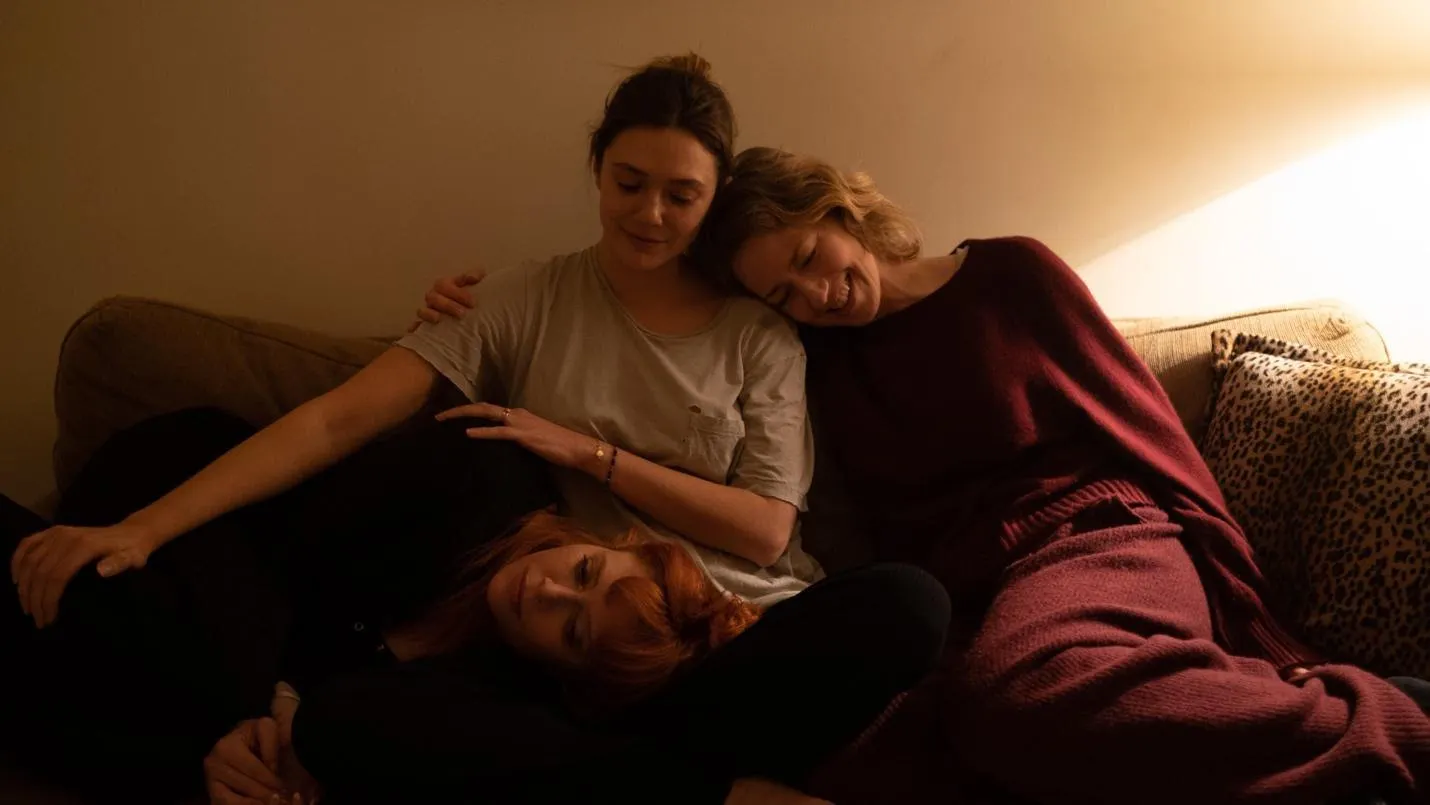Film Review: His Three Daughters
Film
His Three Daughters
Director: Azazel Jacobs
High Frequency Entertainment, Arts & Sciences, Tango Entertainment
In Theaters: 09.06
Streaming on Netflix: 09.20
If there’s anything that I learned from facing the passing of my parents alongside my siblings, it’s that no matter how determined you are to do things the right way and make it go smoothly for everyone, you can’t plan your emotions, especially when it comes to endings. His Three Daughters brings to life the experience of staring down death together and trying not to be pulled apart by it.
As Vincent (Jay O. Sanders, JFK, Bardo, False Chronicle of a Handful of Truths) is on his deathbed, his three daughters gather together at his Bronx apartment to be there when the moment finally comes. There’s Katie (Carrie Coon, The Leftovers, Ghostbusters: Afterlife), an uptight and controlling mother who is dealing with difficulties with her teenage daughter; Christina (Elizabeth Olsen, Wind River, Avengers: Endgame), a lighthearted and bubbly young mother and their half sister Rachel (Natasha Lyonne, Russian Doll, Poker Face), a pot-smoking, aimless loner who has never moved out of her father’s apartment and doesn’t share the same connection or see eye to eye with the other two. Over the course of three days spent cooped up together in the apartment, emotions run high and the tension between the disapproving Katie and the increasingly frustrated Rachel is thick. As they wait for the inevitable, it brings out the best and the worst in all of them. Old wounds and unexpressed feelings are brought to the surface, and they face the question of whether this is not just an ending for their father, but also for their tenuous relationship with each other.
Writer/director Azazel Jacobs (The Lovers, French Exit) has created a searing and unforgettable portrait of a time and experience that is incomparable to any other in life, and for anyone who has been through it, His Three Daughters is almost as unsettling and painful as it is profoundly moving and insightful. While the minimalist story, confined largely to one location and a small number of characters, is much like a stage play in its construction, Jacobs makes better use of the medium of film than most bigger and grander epics have managed to do in recent memory with his mastery of cinematic language. The detailed little brush strokes, from avoiding letting the three women be in a shot together from the beginning, confining them each to their own frame as long as they remain emotionally distant from each other, to the rather unique touch of Rachel’s isolation being highlighted by Katie and Chistina occasionally breaking into gibberish when speaking to each other, is painstakingly conceived and paints quite a vivid picture. Jacob’s screenplay lets us get to know each daughter in little spurts, forming ideas and judgements of who they are and how they see themselves and each others, only to peel back layer after layer, revealing hidden strengths as well as hidden vulnerabilities. The claustrophobic trapping of the small apartment beautifully mirrors each sister’s feeling of being trapped, and yet as things progress, it also represents a safety bubble that surrounds them—a bubble that each is more afraid of losing than they ever dare admit to themselves.
The ensemble cast is incredible, with the brilliant material giving each of them a chance to shine, and if anything is keeping Coon, Olsen and Lyonne from serious Oscar contention, it’s the fact that they are such equal leads that it’s hard to separate them into categories. The greatness of the film lies in the fact that these powerhouse performers aren’t here for Oscars, but rather to tell a story and bring a family to life. Coon is one of Hollywood’s most underrated actors, and her portrayal of Katie’s slow discovery that in her efforts to things held together, she’s built walls around herself and kept her sisters on the other side, is fearless in its honesty. Olsen, who gave perhaps one the strongest performances in the MCU until it was undermined in Doctor Strange in the Multiverse of Madness, is truly a marvel here, bringing a richness and lovability to arguably the most well adjusted of the trio. Lyonne is mesmerizing as the deeply hurting yet oddly numb Rachel, who may be the one most affected by all of this, and it’s a heartbreaking turn that may be the standout performance among a cast of standouts. Jovan Adepo (Fences, When They See Us) is mostly kept in the background as Rachel’s boyfriend Benji, yet when he gets his moment to speak his mind, it’s a highlight of the film to see a well-rounded and real character fully realized in this one stunning sequence.
His Three Daughters wasn’t the easiest movie to watch for me, but it’s the most rewarding and memorable film I’ve seen this year by a sizable margin, and both a painful and cathartic experience. It’s the kind of simple and real drama that doesn’t need embellishments, twists or lurid surprises, because it’s so deeply rooted in truth that no such ploys are needed to be keep the audience utterly transfixed till the very end. –Patrick Gibbs
Read more film reviews:
Film Review: The Deliverance
Film Review: Reagan

